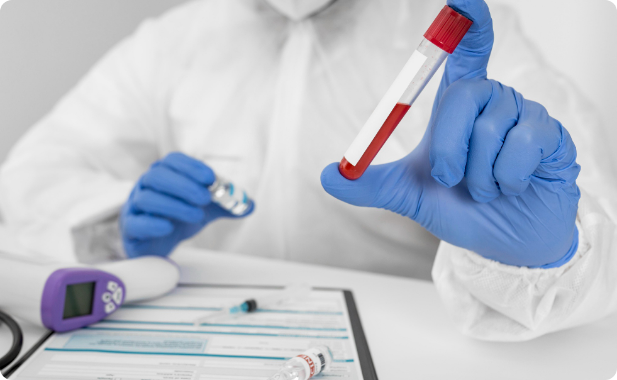SHARE
Chlamydia is a bacteria that the naked eye cannot see. However, when people refer to “what chlamydia looks like,” they often mean the symptoms or effects it has on the body.
Chlamydia is a Sexually Transmitted Infection (STI) that can cause a variety of symptoms in both men and women, including:
- Unusual discharge from the penis or vagina
- Pain or burning sensation during urination
- Pain or swelling in the testicles (in men)
- Pain during sexual intercourse (in women)
- Bleeding between periods (in women)
- Abdominal pain (in women)
However, many people with chlamydia don’t experience any symptoms at all, which is why regular STI testing, especially for sexually active individuals, is crucial for diagnosis and treatment.
If left untreated, chlamydia can lead to serious health complications, including infertility and pelvic inflammatory disease (PID) in women.
But what does chlamydia look like? Let’s understand it in this blog.

Get Chlamydia Treatment
Quick, discreet treatment to eliminate chlamydia infections.
Book Now
What Does Chlamydia Look Like?
In women and men, “What does chlamydia look like?” are typically referred to as symptoms, and they can vary. However, in women, it is often asymptomatic and can include
Chlamydia Symptoms in Women
- Abnormal vaginal discharge that has a strong odor and may be yellowish
- Pain or burning sensation during urination
- Pain or discomfort during sexual intercourse
- Abdominal or pelvic pain ranges from mild to severe and can sometimes be mistaken for menstrual cramps
- Irregular bleeding or spotting between periods
- Rectal pain, discharge, or bleeding
Chlamydia Symptoms in Men
- Painful urination
- A white, cloudy, or watery discharge from the tip of the penis
- Swelling or pain in the testicles
- Rectal pain, discharge, or bleeding during sexual intercourse

Clear Chlamydia Quickly!
Efficient, private treatment for chlamydia infections from home.
Talk to a Doctor Online
Clear Chlamydia Quickly!
Efficient, private treatment for chlamydia infections from home.
Talk to a Doctor OnlineWhat Are Chlamydia Tests?
Chlamydia is the most prevalent sexually transmitted infection (STI) reported among young individuals in Australia.
Most remain unaware of their infection. This lack of awareness can cause transmission to sexual partners and highlights the importance of regular testing.
These are the available chlamydia tests for detecting chlamydia:
Standard Testing
It is advisable to opt for comprehensive testing if:
- Blood testing is necessary.
- Symptoms are present.
- Treatment or medications are required.
- Sexual contact has occurred with someone known to have an STI or HIV.
- Sexual contact has occurred with an individual from overseas, and no blood test for syphilis or HIV has been conducted since.
- Injection drug use is a factor.
- Rectal or throat testing is needed.
If you have questions regarding STIs or their symptoms, speak to a medical professional immediately.
You can also speak to an online doctor service if you live in rural Australia or wish to have a consultation from the comfort of your home.
Also Read: The Importance of Early Detection: Chlamydia Testing Online

Get Chlamydia Treatment
Quick, discreet treatment to eliminate chlamydia infections.
Book Now
When to Undergo Chlamydia Testing?
A Chlamydia test is advised for all sexually active individuals aged over 30 or those who perceive themselves to be at risk. Recommendations for testing frequency are as follows:
Heterosexual individuals: Once annually
Men who have sex with men: More frequent testing
Those at high risk: Frequent testing

Treat Chlamydia Swiftly!
Quick, discreet treatment to eliminate chlamydia infections.
Get Treated Now
Treat Chlamydia Swiftly!
Quick, discreet treatment to eliminate chlamydia infections.
Get Treated NowWhy is a Chlamydia Test Important?
Since chlamydia is a common infection, it is suggested to undergo regular screening.
For individuals with a cervix (the lower part of the uterus), including women and transgender or gender-diverse individuals, the following guidelines apply:
If you are younger than 25 and sexually active, or if you are 25 or older and possess an elevated risk due to:
- Having a new sexual partner or multiple partners
- Engaging with a partner who has multiple sexual partners
- Having a partner diagnosed with an STI
- Inconsistent condom use
Pregnancy
It is recommended to undergo chlamydia testing at least annually or as required during pregnancy.

Get Chlamydia Treatment
Quick, discreet treatment to eliminate chlamydia infections.
Book Now
What Happens During a Chlamydia Test?
To conduct a chlamydia test, a sample of fluid from the potentially infected area of your body is required. Two methods are commonly used:
First-catch urine sample
This involves collecting urine from the initial part of your urinary stream using a sterile cup. For accurate results, it’s essential to refrain from urinating for at least two hours before the test.
Swab sample
A healthcare provider utilizes a specialized swab or brush to collect cells, typically from the genital region (urethra or vagina).
This process may cause slight discomfort. Swabbing the rectum, cervix, throat, or eyes may be necessary. A doctor might offer the option of self-swabbing with detailed instructions.

Get Chlamydia Consultation!
Efficient, private treatment for chlamydia infections from home.
Talk to a Doctor Online
Get Chlamydia Consultation!
Efficient, private treatment for chlamydia infections from home.
Talk to a Doctor OnlineConclusion
Understanding what chlamydia looks like involves recognizing its subtle or absent symptoms and the importance of regular testing.
Chlamydia’s silent nature highlights why it is essential to have routine screening, especially for at-risk populations.
Early detection and treatment are crucial to prevent complications and protect overall health. Get the proper treatment for this condition by speaking to a doctor online using a chlamydia telehealth service.

